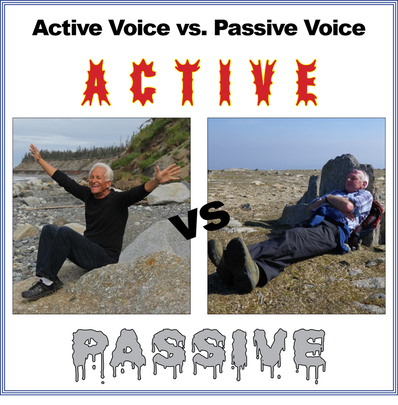
WHAT’S THE DIFFERENCE AND WHY DOES IT MATTER?
The use of active or passive voice is a basic distinction that often causes trouble for many writers. Growing up, students are often drilled that they should avoid the passive voice because it is “weak.” It’s not quite that simple. Basically, the passive voice gets short shrift, but passive should be used appropriately. Depending on the ideas being expressed and the medium where the copy appears, the passive voice can be an appropriate, sophisticated, and even preferable choice over the active voice. With that said – or in this case, written – the active voice is often a better choice; and you may use both in the same article, depending on the context and content of your sentences. There are two types of passive sentences:
- Short passive: in which the subject or performer of the action is not known
- Long passive: in which the agent performing the action is known, but it is not the subject of the sentence.
At the most basic level, the active voice emphasizes the subject or agent who performs an action; in short, the “actor.” The passive voice emphasizes the recipient of the action or sometimes the action itself.
Example 1:
- Active: “The dog chased the ball.”
- Passive: “The ball was chased by the dog.”
Yes, it’s a simple sentence, but it gets the point across. Here, the active voice is the better choice. It is concise (tighter), more direct, and strong. The passive voice, in contrast, is clunky and weak. However, there are many examples where we either can’t or don’t want to emphasize the actor – particularly if there’s an element of mystery involved:
Example 2:
Passive: “My wheels were stolen last night.” Here, the speaker may not, or doesn’t, know who stole his car; this use of the passive voice is perfectly appropriate. The active alternative would be “Someone stole my wheels last night.” (But this is a case where the speaker probably likely wants to emphasize the action rather than the perpetrator. He wants to emphasize that something bad happened to her. You’ll notice something about the two passive examples above: both use a form of the verb “to be” – in this case, the past form “was” (“was chased,” “was stolen”). This is called a “helping” or “auxiliary” verb because it helps to complete the sentence (you can’t say “My car stolen on Sunday night”). These verbs aren’t needed in active sentence constructions, which is one main reason why many people say that active sentences are tighter and stronger.
Both the active and passive voices can be appropriate choices in scientific/academic writing. In news writing, marketing and collateral material, and other consumer-driven work, active voice tends to be preferred. It’s easy to default to the passive voice in academic writing, and sometimes it really is the better choice. If you are undecided, try rephrasing the sentence in the active voice and asking yourself whether it changes the meaning of your sentence, or simply makes your writing clearer and more concise.
